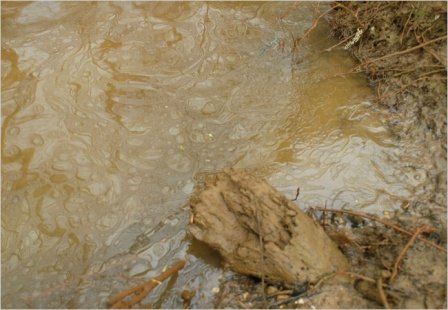Biodiesel Production Producing Pollution
The New York Times reports that biodiesel producers are dumping vegetable oil byproducts into local streams and rivers, harming wildlife.The National Biodiesel Board claims that their members' industrial byproducts are "nontoxic, biodegradable and suitable for sensitive environments." Yes, well, Bruce P. Hollebone, researcher with Environment Canada, says the result is some bad shit for birds and fish. "As with most organic materials, oil and glycerin deplete the oxygen content of water very quickly, and that will suffocate fish and other organisms. And for birds, a vegetable oil spill is just as deadly as a crude oil spill.” The problem is, of course, money. "Glycerin, an alcohol that is normally nontoxic, can be sold for secondary uses, but it must be cleaned first, a process that is expensive and complicated. Expanded production of biodiesel has flooded the market with excess glycerin, making it less cost-effective to clean and sell." And more cost effective to dump in untreated form. The National Biodiesel Board dismissed a litany of violations as "growing pains" for an industry that's doubled in the last year (to 160 plants). Oh, that's OK then.
More by Robert Farago


































Comments
Join the conversation
I now see how biodiesel and ethanol can solve our domestic energy problems. As all the byproducts of the process to create the fuels creates an ever growing plume at the mouth of the Mississippi and other rivers, the state of [s]NIMBY[/s] Florida will relent and choose off shore oil wells over brown water.
I'm a homebrewer of BioDiesel so I'm aware of the process and dealing with the byproducts. Glycerin is not vegetable oil, nor is it an alcohol. I suspect the "Glycerin an alcohol" above should have been "Glycerin AND alcohol" (emphasis mine) since those two things (along with food waste if the source is used fryer oil) are the byproducts of BioDiesel production. Glycerin is basically free fatty acids from veggie oil, bonded to the base element (either lye or potassium hydroxide.) The elements used in BioDiesel reaction are rather toxic in their original form, methanol and the strong base catalysts, but once combined chemically with the veggie oil feedstock to make Glycerin they are rather benign in the larger scheme of things. In fact, you could eat them. Your local car wash or dry cleaner is FAR more chemically toxic than a BioDiesel producer. However dumping any of this stuff into the water supply is just plain stupid. Especially since there are ways of safely disposing of these items. BioDiesel producers perform methanol recovery to extract as much of the methanol (by far the most expensive element of BioDiesel production) out of the byproduct for re-use. Glycerine can be safely composted. But, like any industry, greed and ignorance can make people take shortcuts. Those who do should be prosecuted, and if need be, shut down. Overall though, given the choice of living near a petroleum refinery or a BioDiesel plant, I'd pick the latter by a wide margin. Just because a couple of idiots did something stupid doesn't mean the whole industry is equally bad. --chuck http://chuck.goolsbee.org
heh... thanks for the education Engineer. I rely on my Chemist friends to straighten me out now and then. ;) --chuck